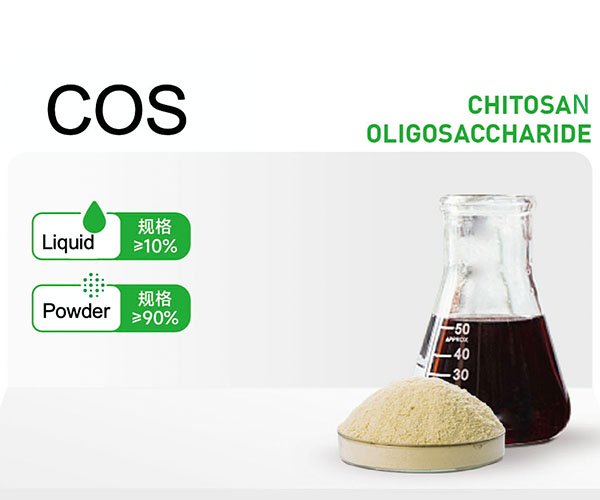- Agricultural Chitosan Oligosaccharides(COS)
- CAS NO.:148411-57-8
Specifications
- Appearance: Light yellow powder
- Content: 90% min.
- Average molecular weight: 3000 max.
- Deacetylation degree: 90% min.
- Water insoluble matter: 0.5% max.
- pH(1:100): 5.0-7.0
Chitosan oligosaccharide is a type of water-soluble sugar with low polymerization degree linked by N-acetylglucosamine or glucosamine through β-(1,4)-glycosidic bonds.
Chitosan Oligosaccharides(COS) has unique functional properties:
- Effectively induce crops to produce resistant substances and improve defense capabilities;
- Induces and activates the plant immune system and improves plant anti-viral ability;
- Green and environmentally friendly, does not pollute the environment;
- It has dual biological regulatory functions of both medicinal and fertilizer effects, and is a type of chitinase inhibitor.
Research progress of chitosan oligosaccharides(COS)
Basic research on chitosan oligosaccharide as a plant immune activator began in the 1960s. Research has found that chitosan oligosaccharide has the functions of regulating plant growth, development, reproduction, disease prevention and resistance, and can stimulate the plant’s immune system response. Each active chitosan oligosaccharide can send out information to regulate specific functions, activate defense responses and regulate plant growth, produce active substances with anti-disease properties, and inhibit the formation of diseases.
Active chitosan oligosaccharides are a type of polymer with a certain structure and biological activity. The most studied internationally are oligosaccharide fragments that degrade plant and microbial cell wall polysaccharides.
More and more experimental results show that plant cell walls not only serve as a structural barrier for defense, but also can produce active defense responses when plants are infected by pathogens. The reasons are:
- On the one hand, plant cell wall enzymes can hydrolyze α-glucan, chitin, etc. in the cell walls of pathogenic bacteria to produce active ingredients and induce the expression of plant phytoalexin and other synthetic enzyme genes;
- On the other hand, when pathogens invade plants , must hydrolyze the polysaccharides of plant cell walls, and their degradation products can also induce the synthesis of phytoalexins.
Therefore, chitosan oligosaccharide(COS) can effectively induce defense responses in plants and activate systemic acquired immune responses in plants.
The effect of chitosan oligosaccharides(COS) in agriculture
1. Chitosan oligosaccharides(COS) can induce plant resistance:
Chitosan oligosaccharide can effectively induce plant defense responses and activate the plant’s systemic acquisition of immune resistance. The induction activity of chitosan oligosaccharide is closely related to the degree of polymerization and deacetylation of chitosan oligosaccharide. Low degree of polymerization and high degree of deacetylation have induction activity on plants.
2. Rooting and nourishing, preventing root diseases.
Promote the secretion of auxin and cytokinin from the root tip, and promote root growth.
3. Antibacterial and antibacterial, inhibiting virus activity.
Chitosan oligosaccharide contains protonated ammonium. The protonated ammonium combines with the negatively charged cell membrane in bacteria, interferes with the function of the bacterial cell membrane, and causes the loss of cytoplasm in the bacterial cell. At the same time, COS has a small molecular weight. It easily enters the interior of the bacteria and disrupts the normal physiological metabolism of the bacteria, thereby achieving an antibacterial effect.
4. Regulate crop hormone levels, preserve and expand fruits.
Regulate the secretion process of various hormones in crops, and promote fruit setting and expansion.
5. Improve crop quality and extend shelf life.
Increasing the calcium content of fruits and vegetables can increase the crispness of crops, reduce bitterness and improve taste. At the same time, it can enhance the absorption of trace elements and increase the sugar content of crops. And, harvesting earlier improves quality and extends shelf life.
6.Chitosan oligosaccharides(COS) can reduce pesticide residues.
Reduce the use of fertilizers and pesticides, reduce pesticide residues, and reduce fertilizer and pesticide damage.
7. Improve the soil and increase the microbial system.
Make the soil aggregate, improve soil aeration, drainage and fertility retention, thereby promoting root development, increasing root hairs and enhancing nutrient absorption.
8. Promote plant growth and increase yield.
Chitosan oligosaccharide itself is rich in C and N, which can be decomposed and utilized by microorganisms and used as nutrients for plant growth; it can change the soil microflora, promote the growth of beneficial microorganisms and inhibit some plant pathogenic bacteria.


